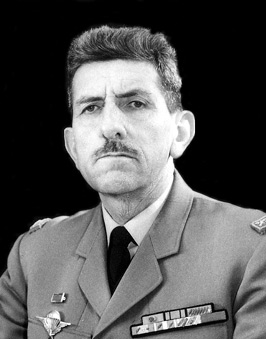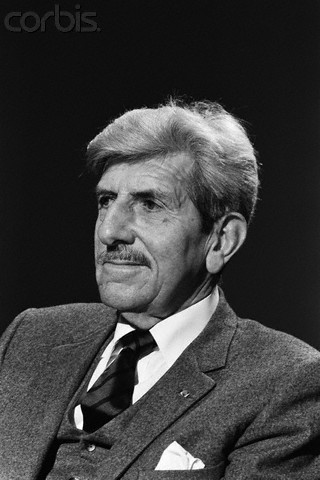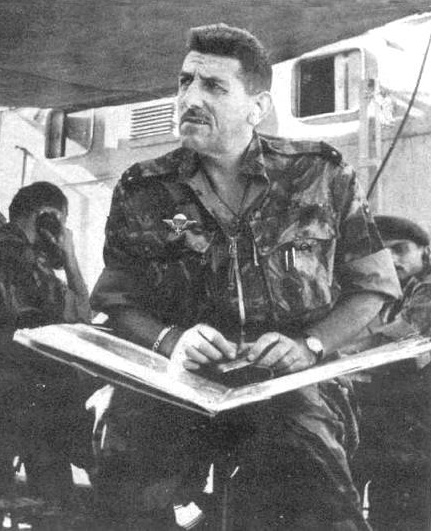<Back to Index>
- Général d'Armée of the French Army Jacques Émile Massu, 1908
PAGE SPONSOR



Jacques Émile Massu (5 May 1908 – 26 October 2002) was a French general who fought in World War II, the First Indochina War, the Algerian War and the Suez crisis.
Jacques Massu was born in Châlons - sur - Marne to a family of military officers; his father was an artillery officer. He studied successively at Saint - Louis de Gonzague in Paris, the Free College of Gien (1919 – 1925) and Prytanée National Militaire (1926 – 1928). He then entered Saint - Cyr and graduated in 1930 as a second lieutenant in the promotion class "Marshal Foch" and chose the Colonial Infantry.
Between October, 1930 and August, 1931, he served in the 16th Senegalese Tirailleur Regiment (16th RTS) in Cahors. He was sent to Morocco with the 5th RTS and took part in the fighting around Tafilalt where he earned his first citation. He was promoted to lieutenant in October 1932 and took part in the operations in High Atlas, earning a new citation.
In 1934 Massu was transferred to 12th RTS at Saintes, Charente - Maritime. He served in Togo from January 1935 to February 1937 performing military and civilian duties in Komkombas. Then he was stationed in Lorraine with the 41st RMIC until June 1938, when he was sent to Chad to command the subdivision of Tibesti with headquarters in Zouar.
He was serving in Africa when World War II broke out, and joined the Free French Forces. He took part in the battle of Fezzan with the armored troops of General Leclerc. In 1941, he was in charge of the bataillon de marche du Tchad. He served as a lieutenant colonel in the 2nd Armored Division (2e DB) until the end of the war.
In September 1945, he landed in Saigon and took part in the retaking of the city and of the South of Indochina.
In 1956, the 10th Parachute Division was sent in Egypt to take back the Suez canal during the Suez crisis.
A Brigadier General in June 1955, Massu commanded the groupe parachutiste d'intervention and from 1956 the 10e Division parachutiste. France sent Massu and his division to Algeria in response to a wave of armed attacks and terrorist bombings coordinated by Algerian FLN. Massu ultimately won the Battle of Algiers in 1957, during which French forces were able to identify and arrest the leadership of the FLN in Algiers through the successful application of coercive methods of interrogation and outright torture on members of subordinate cells. In July 1958, he was promoted to Général de division and took the head of the army corps of Algiers, as well as functions of prefect for the region of Algiers.
It was said of Massu that he willingly admitted to the use of torture on suspected members of the FLN. However, he insisted that he would never subject anyone to any treatment that he had not first tried out on himself.
The Algier crisis of 1958, began when the current government suggested that it would negotiate with the Algerian nationalists, bringing the instability and ineffectiveness of the Fourth Republic to a head. Right wing elements in the French Army, led by General Massu seized power in Algiers and threatened to conduct an assault on Paris, involving paratroopers and armored forces based at Rambouillet, unless Charles de Gaulle was placed in charge of the Republic. De Gaulle did so under the precondition that a new constitution would be introduced creating a powerful presidency in which a sole executive, the first of which was to be De Gaulle, ruled for seven year periods. These changes were introduced and the Fifth Republic was born. In July 1958 he became général de division (3 stars).
On 14 January 1960, Massu gave an interview in which he declared:
Massu was immediately relieved of command and sent back to the mainland.
After his criticism of the policy of de Gaulle in 1960, Massu was fired from his positions of military governor of Algiers. In 1962 he became military governor of Metz and of the Sixth military region in France. Promoted to général de corps d'armée (4 stars) in 1963. In March 1966, he became général d'armée (5 stars) and was made chief of the French forces in Germany. On 29 May 1968, Charles de Gaulle came to visit him at his headquarters in Baden - Baden during the events of May 68. Massu assured de Gaulle of his support, but according to some sources conditioned it upon an amnesty for French military officers implicated in coup attempts during the Algerian War.
Massu retired from military duty in July 1969 and spent the rest of his life in his home at Conflans - sur - Loing writing his memoires. He died there on 26 October 2002.